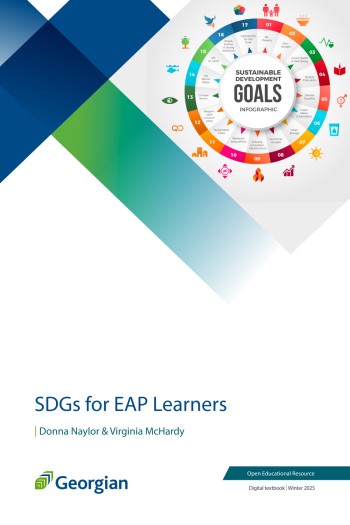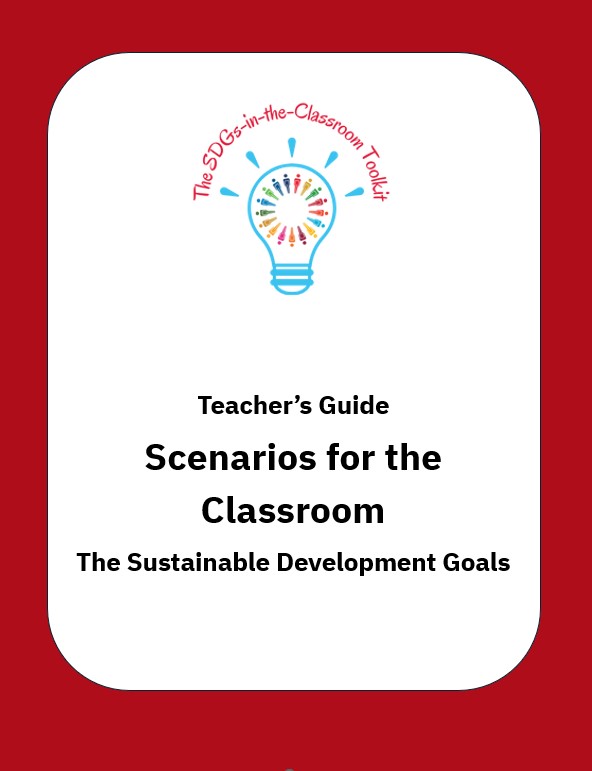Planning
New Resource

SDGs for EAP Learners
(2025) by Donna Naylor and Virginia McHardy from Georgian College.
This Open Educational Resource (OER) provides an introduction to the 17 Sustainable Development Goals (SDGs) established by the United Nations.
- Each chapter is dedicated to one SDG, offering a clear overview of its purpose, key targets, and global impact.
- Designed for academic language learners, the resource includes vocabulary lists and definitions to support comprehension.
- To encourage critical thinking and engagement, each chapter features discussion questions that prompt students to reflect on real-world applications, challenges, and potential solutions related to the SDG.
- The OER is accessible and interactive, making it a valuable resource for educators and learners in diverse academic settings.
- SDGs for EAP Learners is licensed under CC BY-NC 4.0, except where otherwise noted. Individual sections, content, images and activities are marked with their relevant copyright and open licensing information.

Scenarios for the Classroom - Teacher's Guide
This comprehensive guide promotes critical thinking and global awareness, enabling teachers to create engaging, interdisciplinary lessons that inspire students to address real-world challenges.
The Teacher's Guide equips teachers with:
- the purpose of and how to use the guide
- an overview of each of the 17 SDGs
- tips for aligning the SDGs to university course objectives
- tips for integrating the SDGs across disciplines
- all 17 SDGs with 4 scenarios
- 17 SDG infographics
- some suggested activities
- a glossary of terms
- View the SDGs #1-#5 Infographic PDF
- View the SDGs #6-#10 Infographic PDF
- View the SDGs #11-#15 Infographic PDF
- View the SDGs #16-#17 Infographic PDF
- 30 Self Nudges for the SDGs is an SDG i-Level Project that launched the Self-Nudging Online Toolkit for University Staff on SDGs. Self-Nudges help remind university teachers and staff of the relevance of their work to the SDGs, prompting them to think about sustainable development, apply this mental framework to their work and as a result create more contributions to SDGs while feeling better about what they do. A continuous and reinforced engagement with the SDGs will create a mindset conducive to forging new individual contributions to sustainable development and the SDGs.
- Read The Little Book of Green Nudges: 40 Nudges to Spark Sustainable Behaviour on Campus .The higher education community has unique opportunities to influence the citizens of tomorrow and to test nudges in real-world laboratories. The United Nations Environment Programme created the Little Book of Green Nudges which shares a practical framework and 40 nudges that can be adopted by colleges and universities, from the small-scale to the large, depending on your resources and context. It is also available in
- Visit Act Now The UN Campaign for Individual Action. Every one of us can help limit global warming and take care of our planet. By making choices that have less harmful effects on the environment, we can be part of the solution and influence change. There is an app to log actions and contribute to the global count.
- For numerous resources for instructors, visit The Aga Khan Foundation of Canada (AKFC).
- Visit the Community Foundations of Canada Resource Library. It can be searched by initiative, topics and type related to the SDGs. They also include news, journal articles, and fact sheets.
- Read the compilation of simulation games and tools to create awareness and mobilization of the SDGs.
- Visit Eco Schools lesson plans that promote an action oriented pedagogy about specific Sustainable Development Goals (SDGs). The lesson are available in English, Spanish, French and Portuguese.
- Read Educatus' blog post for lesson ideas on SDG #4.
- Visit Educators for Social Change (4SC) for resources to help develop students' capacity to become civic leaders. Topics range from global issues, public health, gender, psychology, economics, government.
- Visit the Education and Training Foundation for numerous resources, research and thought pieces related to education for sustainable development. The ETF recognizes the vital role the Further Education (FE) and Training sector has to play in combating climate change and achieving sustainability and social justice both nationally and globally.
- Visit The Global Schools Program a UN initiative that develops the tools, resources and programs to support education systems around the world in shaping a more resilient and sustainable world. Review Lesson Plans.
- Visit The Government of Canada's Sustainable Development Goals Data Hub. It is the central focal point for reporting Canada's data for the SDG indicators. They partner with many councils and organizations and include all 17 goals and some features are Gender, Diversity and Inclusion statistics, Human Activity and the Environment.
- Visit Local Actions for law, media and communications and psychology activities and lesson plans which link to core content in different disciplines and can be easily incorporated into existing courses. Content created by Professors Dr. Thijs Bosker and Dr. Paul Behrens at Leiden University in the Netherlands. Read an introductory article.
- Read the Inspiring Global Citizens Guide from the Aga Khan Foundation. It is a fun and interactive curriculum resource designed to equip educators with the tools they need to teach about sustainable development and global citizenship. Educators can use activities, student assignments, videos, discussion guides, exploration of the SDGs, and real-world examples to inspire students to act and help create a more peaceful, prosperous and equal world for all.
- Visit Learning for Justice to view classroom resources, film kits, student tasks, and teaching strategies. The learning outcomes are divided into four domains—Identity, Diversity, Justice and Action. Resources include the New LGBTQ Best Practices Guide.
- Read the Manitoba Council for International Cooperation Sustainable Foundations: Guide for Teaching the Sustainable Development Goals
- Read OXFAM's Teaching Controversial Issues: A Guide for Teachers. The guide explores what controversial issues are, reasons for teaching controversial issues, the value of a global citizenship education approach, guidance and classroom strategies for handling and exploring controversial issues and some practical activities for teaching controversial issues.
- Read the guide developed by OXFAM called The Sustainable Development Goals: A Guide for Teachers.
- Visit The Saskatchewan Council for International Cooperation's Global Citizenship Education Program that helps teachers integrate international development and global justice into their classrooms by providing free downloadable teaching resources.
- Visit the Taking Action section of the United Nation's Lazy Person's Guide to Saving the World or visit the homepage.
- Visit UNESCO and UNICEF for the The World's Largest Lesson and view Instructor Resources.
- Visit The University of Buffalo's Experiential Learning Network for several projects for students related to the SDGs.
- Visit The University of Saskatchewan's Educatus: The Official Blog of The Gwenna Moss Centre for Teaching Effectiveness. They have a post series around the 17 Sustainable Development Goals (SDGs). Each post will dive into one of the goals and how we as educators can strive to embed these into our own courses. It is in the author’s opinion that any course or class can connect with one of the 17 goals or 169 sub-targets.
- Read The University of Saskatchewan's SDGs in Teaching and Learning Workbook.
- Visit the Wakelet SDG page for lesson plans, links, videos, student challenges, activities, infographics and tasks for all of the 17 SDGs.
- Visit the World Business Council for Sustainable Development (WBCSD). There is a comprehensive collection of resources for businesses to integrate the SDGs. There is also a hub on The Good Life Goals that are actions anyone can take to support the SDGs.
Helpful Tools
- Visit Black Illustrations by founder and designer John D. Saunders. He created beautiful, black illustrations for use in digital projects around the world.
- Review the Compiled Keywords for SDG Mapping tool and the Excel spreadsheet of a list of Sustainable Development Goal keywords used in classes infusing the SDGs.
- Visit the Gender Spectrum Collection. This is a stock photo library featuring images of trans and non-binary models. The collection aims to help better represent members of these communities as people not necessarily defined by their gender identities—people with careers, relationships, talents, passions, and home lives. All of the photos in the Gender Spectrum Collection were taken by Zackary Drucker.
- Visit The Noun Project for free icons and photos for everything. They are building a global visual language for quick and easy communication no matter who you are or where you are.Visit Unsplash which is the source for freely usable images
- Visit Photos for Class a site created for instructors to find age-appropriate, educational and safe images along with automatic citations and licensed by Creative Commons.
- Visit WOCinTechChat images that are licensed under a Creative Commons Attribution-License.
- Visit the UN CC: Learn for a tool that allows you to test your climate change IQ; get recommendations on how to improve your knowledge and skills; and build confidence to become a climate champion.
Videos
- Watch How to Embed the SDGs into Your Online Teaching and Learning from Times Higher Education. It is a discussion about how the digital transformation of higher education could be used to drive progress towards the SDGs. It touches upon issues such as embedding sustainability into teaching, improving access to education, reducing inequalities and boosting inclusivity, enhancing cross-border collaboration and public engagement and reducing environmental impact.
- Visit The Aga Khan Foundation of Canada for many video resources for instructors.
- Visit The Global Goals Videos Library for videos for all audiences.
- Watch the Leave No One Behind video developed by The Leave No One Behind Partnership and supported by UKaid. It is a short, inspiring video which focuses on the commitment to Sustainable Development Goals.
- Watch Do You Know All 17 SDGs? a video by the UN that provides a brief introduction to the 17 Goals.
